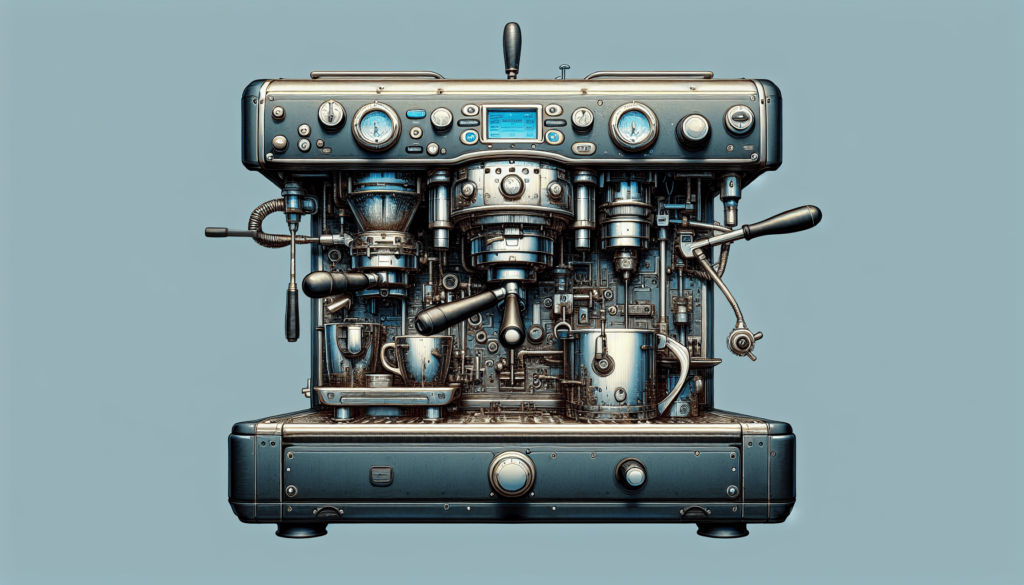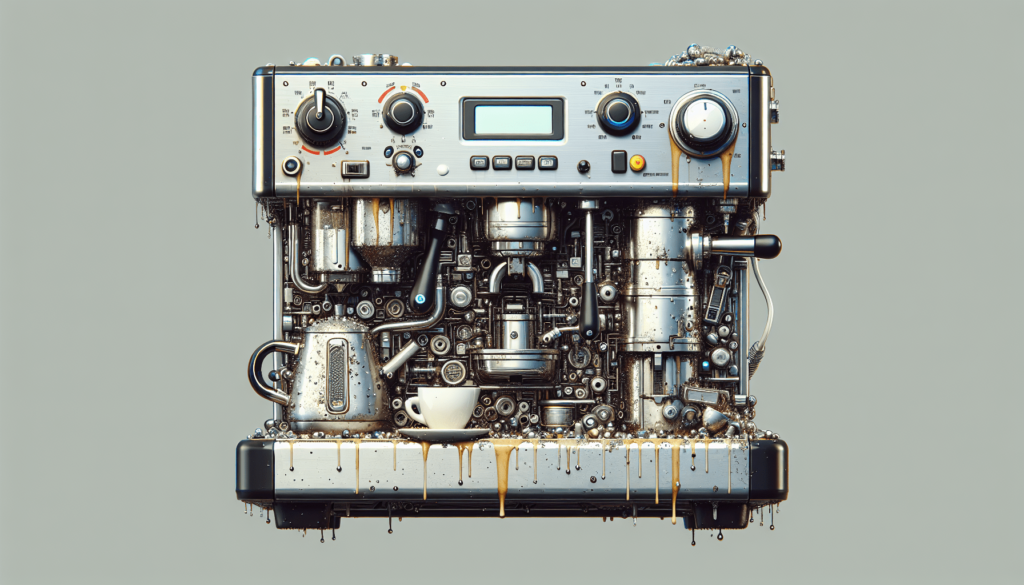Have you ever wondered if descaling your coffee machine is truly necessary? If you’re a coffee enthusiast, you know the joy of savoring that perfect cup. But maintaining that level of quality requires regular care and maintenance, and one critical aspect of this is descaling. Today, we’ll explain why descaling is so important, how often you should do it, and the best ways to go about it.

Understanding the Problem: Scale Build-Up
What Is Scale and How Does It Form?
Scale, also known as limescale, is a hard, chalky deposit primarily made up of calcium carbonate. This substance forms in your coffee machine when you use water that contains minerals like calcium and magnesium. Over time, these minerals accumulate, particularly in areas that heat water, such as the boiler or heating element.
How Does Scale Affect Your Coffee Machine?
Limescale build-up can lead to a multitude of problems:
- Reduced Machine Efficiency: The heating element has to work harder to heat the water, consuming more energy and time. This inefficiency can eventually lead to damage.
- Poor Coffee Quality: The build-up can affect the temperature and pressure at which coffee is brewed, impacting the taste and consistency of your coffee.
- Shortened Lifespan: Continuous build-up can cause internal components to wear out faster, leading to more frequent repairs or the need for a new coffee machine altogether.
Why Descaling Is Crucial
Consistent Coffee Quality
Regular descaling ensures that your coffee machine operates at optimum efficiency, maintaining consistent water pressure and temperature. This consistency is key to producing your favorite beverage just the way you like it every single time.
Machine Longevity
By preventing scale build-up, you significantly increase the lifespan of your machine. Think of descaling as a form of preventative maintenance. Similar to how you would change the oil in your car, you should routinely descale your coffee machine to keep it in excellent working condition.
Energy Efficiency
A machine that is free of scale operates more efficiently. This means it uses less electricity to heat the water, which can also save you money in the long run. An efficient coffee machine is an environmentally friendly machine.
How Often Should You Descale?
Depending on Water Hardness
The frequency of descaling largely depends on the hardness of the water you use. Water hardness can vary significantly based on your geographic location, so it’s a good idea to test your tap water for mineral content.
| Water Hardness | Descaling Frequency |
|---|---|
| Soft | Every 3-4 months |
| Medium | Every 2-3 months |
| Hard | Every 1-2 months |
Usage Frequency
How frequently you use your coffee machine also plays a crucial role in determining descaling intervals. If you use your machine multiple times a day, you’ll need to descale more often than someone who uses it just once daily or a few times a week.
Signs Your Coffee Machine Needs Descaling
Brewing Takes Longer
One of the first signs that your coffee machine needs descaling is that the brewing process begins to take longer than usual. This happens because scale build-up can obstruct water flow and reduce heating efficiency.
Odd Tastes in Coffee
If your coffee starts to taste off, even though you haven’t changed the beans or your brewing method, it could be due to limescale affecting the brewing temperature and pressure.
Visible Build-Up
Seeing white, chalky deposits on your machine is a clear indicator that descaling is overdue. You might notice this in your water reservoir or around the heating element.

How to Descale Your Coffee Machine
Commercial Descaling Solutions
There are numerous commercial descaling solutions available that are specifically designed for coffee machines. These solutions are generally effective and come with detailed instructions, making the process straightforward.
DIY Descaling with Vinegar
A homemade descaling solution can be made using vinegar, a common household item. Mix equal parts of water and white vinegar and use this solution to clean your coffee machine.
Steps to Descale with Vinegar:
- Fill the Reservoir: Mix equal parts water and vinegar and fill the water reservoir.
- Run the Machine: Start the brewing cycle and let it run halfway before pausing. This allows the solution to work on the scale.
- Soak: Let the machine sit for about an hour to let the vinegar dissolve the limescale.
- Complete the Cycle: Resume and finish the brewing cycle.
- Rinse: Run multiple cycles with fresh water to remove any vinegar residue.
Lemon Juice as an Alternative
Lemon juice is another natural descaling agent that works similarly to vinegar. You can use it in the same way – mix it with water and run it through your machine.
Descaling Coffee Pod Machines
If you own a coffee pod machine, the steps to descale might vary slightly. Always consult the manufacturer’s guidelines, but generally, you’ll follow similar steps to a traditional coffee machine.
Common Misconceptions About Descaling
Only Hard Water Users Need It
Even if you use soft water, descaling is still necessary. While soft water contains fewer minerals, it’s not entirely devoid of them. Regular descaling prevents any build-up, no matter how minimal.
Descaling Is Time-Consuming
While the process may seem cumbersome, it’s relatively quick and straightforward, especially with commercial descaling products. Think of it as investing a few minutes to ensure your coffee machine serves you well for years.
It’s Only for Espresso Machines
Every type of coffee machine, whether it’s a drip brewer, espresso machine, or pod machine, can benefit from regular descaling. The principles of limescale build-up and removal apply universally across all machines that heat water.
Pros and Cons of Different Descaling Methods
Commercial Solutions
Pros:
- Specifically formulated for coffee machines
- Easy to use with clear instructions
Cons:
- Costlier than homemade solutions
- May involve chemicals you’d rather avoid
Vinegar
Pros:
- Inexpensive and readily available
- Natural and safe
Cons:
- Strong odor that requires thorough rinsing
- Potential to leave a lingering taste if not flushed out properly
Lemon Juice
Pros:
- Natural and pleasant-smelling
- Effective at breaking down scale
Cons:
- Can be more costly than vinegar
- May also require thorough rinsing
Preventative Measures
Water Filters
Using a water filter can help reduce the mineral content in your water, thus minimizing scale build-up. Many coffee machines come with built-in water filters, but you can also use filtered water from another source.
Regular Cleaning
Apart from descaling, regular cleaning of your machine can help you spot potential problems early on. Clean the water reservoir, drip tray, and other removable parts frequently.
Use Bottled or Distilled Water
Using bottled or distilled water, which has lower mineral content, can significantly reduce the frequency at which your machine needs descaling.
Conclusion
Descaling your coffee machine is not just a recommended maintenance task; it’s essential for maintaining the quality of your coffee, prolonging the life of your machine, and ensuring energy efficiency. Depending on the hardness of your water and how often you use your coffee maker, regular descaling can make a significant difference. Whether you opt for commercial solutions, vinegar, or lemon juice, maintaining a scale-free coffee machine is a relatively simple task that yields substantial rewards. So next time you brew your favorite cup, you can be confident it tastes just as good as it should.
